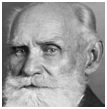|
 |
|
 |
|
|
||
B.F.Skinner - Psychology, Learning and Motivation
B.F.(Burrhus Frederic) Skinner (1904-90)
American psychologist (pictured right). Famous for his ideas about learning and motivation.
Why is he called a “behaviourist”? Because he studied people's behaviour like the psychologists:
His most famous book is… Walden Two (1948) This describes a communal, unmaterialistic and ecological utopia in which people are rewarded for moral and useful actions.
His tips for learning and motivation 1. Rewards motivate people Skinner’s “operant conditioning” says that people are best motivated to do something through:
He experimented with rats in “Skinner boxes”, where they received food (positive reinforcement) for pressing a bar. “The way positive reinforcement is carried out is more important than the amount”, Skinner said.
Punishment (the removal of rewards for doing something bad) isn't a good motivator. Skinner believed that punishment was unsuitable for controlling children. 2. Don’t do everything at once Learning must be gradual. So:
3. Questions and feedback Answer questions and then get immediate feedback from the teacher about how:
This helps to overcome people’s fear of failure which is a major obstacle to learning. To avoid the discouragement of too many wrong answers, the difficulty of questions must be related to people's:
4. Direction and pace Learners should be:
5. Learning by doing People learn by doing things for themselves.
6. Turn your genes into greatness Your performance is determined by your:
Your destiny is controlled by others as well as yourself, so “autonomous man” doesn't exist.
Key quote on education and learning Education is what survives when what has been learnt is forgotten.
Key quote on reading We shouldn’t teach great books, we should teach a love of reading.
Key quote on science and technology The real question is not whether machines think but whether men do.
Key quote on success A failure is not always a mistake; it may simply be the best one can do under the circumstances. The real mistake is to stop trying.
Key quote on motivation The way positive reinforcement is carried out is more important than the amount. A person's behaviour is controlled by his genetic and environmental histories. |
|
|
||
|
|
||
| Copyright © wisdomtowin.com 2025 All Rights Reserved | ||
|









